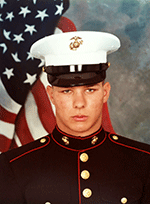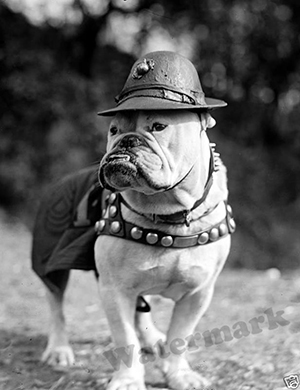It is our honor to provide the Marine Corps Recruit Depot San Diego California with their newest Bulldog Mascot, Private Manny. As a former U.S. Marine, I have always enjoyed Marine Corps history. As a Bulldog lover, the story of how the Bulldog mascot came to be has always been one of my favorites. Since the first Chesty there have been only a handful of United States Marine Corp Bulldog Mascots. Little Manny from BigBulldogs.com is named after Sgt. Johnny R. Manuelito, a Navajo Code Talker who served as a U.S. Marine during World War II. To have an opportunity to participate in Marine Corps history and have one of our baby bullies named after this great American patriot is awesome.
Todd Howard Cpl, USMC 1983-1987 aka, “THE BigBulldog”
The infamous BigBulldogs.com Fred Flintstone on the left and the awesome BigBulldogs.com Captain Crunch on the right are the Grandpa’s to the newest 2019 Marine Corps Mascot “Private Manny” at Marine Corps Recruit Depot San Diego. Meet LCpl. Manny. © 2020 Official U.S. Marine Corps Social Media
LCPl Manny loves the “Marine Corps Hym” feel free oblige him.
[ngg src=”galleries” ids=”14″ display=”basic_slideshow” gallery_width=”1000″ gallery_height=”750″ pauseonhover=”0″ interval=”1000″ transition_speed=”400″]
MCRD San Diego Mascot Changeover Ceremony: Pvt. Johnny Ray “Manny” Manuelito Sr. relieves Cpl. Smedley D. Butler as Marine Corps Recruit Depot San Diego Mascot on May, 24, 2019. “Manny” is named in honor of Sgt. Johnny R. Manuelito, Sr., One of the ‘original 29’ Navajo Code Talkers who trained in the first All Navajo Platoon here on the depot in 1942. Manuelito helped create the code that the Navajos developed at Camp Elliot, now Miramar. He became an instructor, teaching other Navajo Marines the code. (Click below to view video) © 2020 Official U.S. Marine Corps Social Media
MASCOT NAME REVEAL: Meet our newest Mascot Manny, an 8-month old purebred English bulldog. Named after Sgt. Johnny R. Manuelito, a Navajo Code Talker who served as a U.S. Marine during World War II. Sgt. Manuelito legacy will be carried on through Manny, Marine Corps Recruit Depot San Diego newest “DEVIL DOG”. The term Devil Dog or “Teufel Hunden” has been used to describe Marines since World War I because of the ferocious way they fought in battle. German soldiers compared the Marines to the wild and ferocious mountain dogs of Bavarian folklore.
(Click below to view video) © 2020 Official U.S. Marine Corps Social Media
FOX 5 NEWS MARINE CORPS RECRUIT DEPOT WELCOMES NEWEST MASCOT: The Marine Corps Recruit Depot recently welcomed its newest mascot, an English Bulldog named Manny.
(Click below to view video) © 2020 Official U.S. Marine Corps Social Media
© 2020 Official U.S. Marine Corps Social Media
#1 Sgt. Maj. Jiggs Oct. 1922- Jan. 1927
THE PATRIARCH
Thanks to the German Army, the U.S. Marine Corps has an unofficial mascot. During World War I many German reports had called the attacking Marines “teufel-hunden,” meaning Devil-Dogs. Teufel-hunden were the vicious, wild, and ferocious mountain dogs of Bavarian folklore.
Soon afterward a U.S. Marine recruiting poster depicted a snarling English Bulldog wearing a Marine Corps helmet. Because of the tenacity and demeanor of the breed, the image took root with both the Marines and the public. The Marines soon unofficially adopted the English Bulldog as their mascot.
At the Marine base at Quantico, Virginia, the Marines obtained a registered English Bulldog, King Bulwark. In a formal ceremony on 14 October 1922, BGen. Smedley D. Butler signed documents enlisting the bulldog, renamed Jiggs, for the “term of life.” Pvt. Jiggs then began his official duties in the U.S. Marine Corps.
A hard-charging Marine, Pvt. Jiggs did not remain a private for long. Within three months he was wearing corporal chevrons on his custom-made uniform. On New Years Day 1924, Jiggs was promoted to Sergeant. And in a meteoric rise, he got promoted again — this time to Sergeant Major — seven months later.
SgtMaj. Jiggs’ death on 9 January 1927 was mourned throughout the Corps. His satin-lined coffin lay in state in a hangar at Quantico, surrounded by flowers from hundreds of Corps admirers. He was interred with full military honors.
But, a replacement was on the way. Former heavyweight boxing champion, James J. “Gene” Tunney, who had fought with the Marines in France, donated his English Bulldog. Renamed as Jiggs II, he stepped into the role of his predecessor.
Big problem! No discipline! Jiggs chased people, he bit people. He showed a total lack of respect for authority. The new Jiggs would have likely made an outstanding combat Marine, but barracks life did not suit him. After one of his many rampages, he died of heat exhaustion on 1928. Nonetheless, other bulldogs followed. During the 1930s, 1940s, and early 1950s they were all named Smedley, a tribute to Gen. Butler.
In the late 1950s the Marine Barracks in Washington, the oldest post in the Corps, became the new home for the Corps’ mascot. Renamed Chesty to honor the legendary LtGen. Lewis B. “Chesty” Puller Jr., the mascot made his first formal public appearance at the Evening Parade on 5 July 1957. In his canine Dress Blues, Chesty became an immediate media darling, a smash hit!
After the demise of the original Chesty, the replacement was named Chesty II. He became an instant renegade. You name it, he did it. He even escaped and went AWOL once. Two days later he was returned in a police paddy wagon. About the only thing he ever managed to do correctly was to sire a replacement.
In contrast to his father, Chesty III proved to be a model Marine. He even became a favorite of neighborhood children, for which he was awarded a Good Conduct Medal. Other bulldogs would follow Chesty III (bulldogs don’t live long). When Chesty VI died after an Evening Parade, a Marine detachment in Tennessee called Washington. Their local bulldog mascot, LCpl. Bodacious Little, was standing by for PCS orders to Washington, they reported.
Upon arrival at the Marine Barracks in Washington, LCpl. Little got ceremoniously renamed Chesty VII. He and the English Bulldogs who followed him epitomize the fighting spirit of the U.S. Marines. Tough, muscular, aggressive, fearless, and often arrogant, they are the ultimate canine warriors.
English Bulldogs. Teufel-hunden. Devil Dogs. They symbolize the ethos of the Warrior Culture of the U.S. Marines.
(Warrior Culture of the U.S. Marines, copyright 2001 Marion F. Sturkey)
© 2020 Official U.S. Marine Corps Social Media


